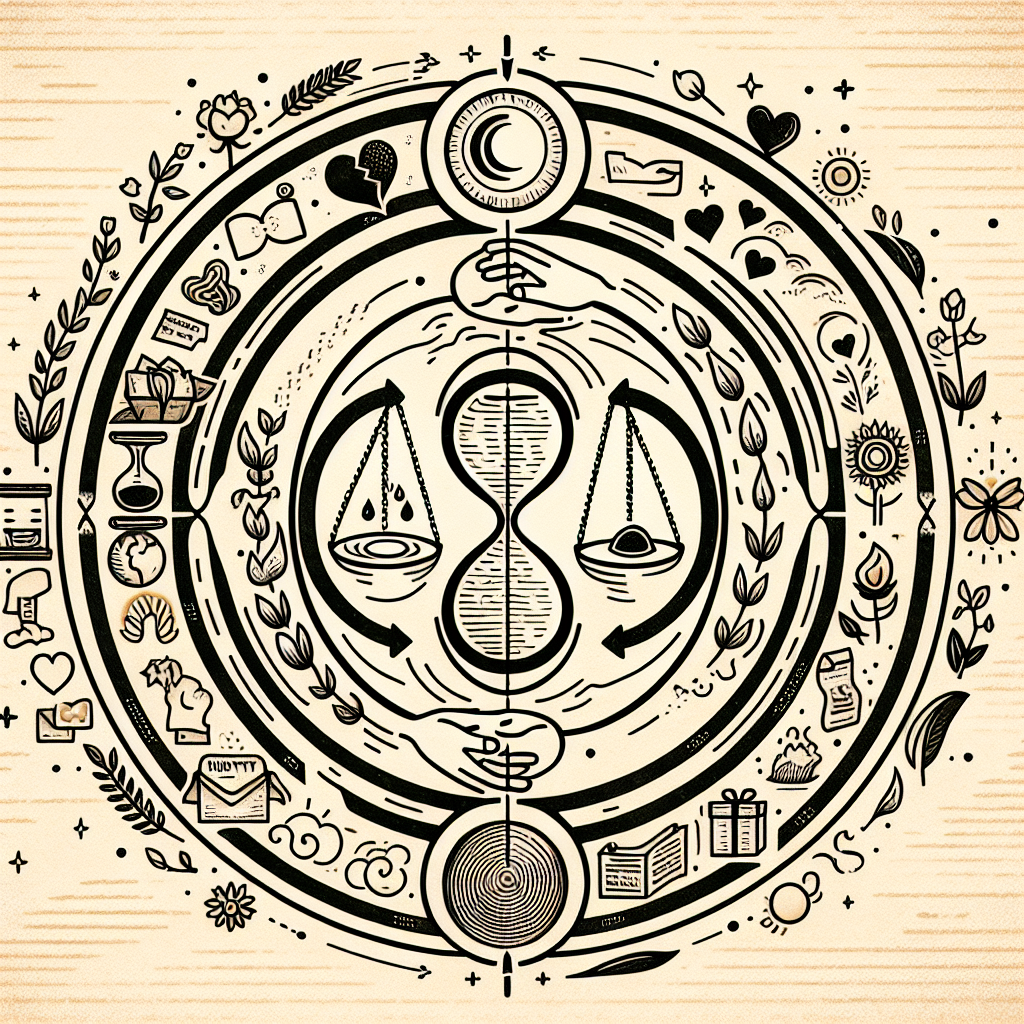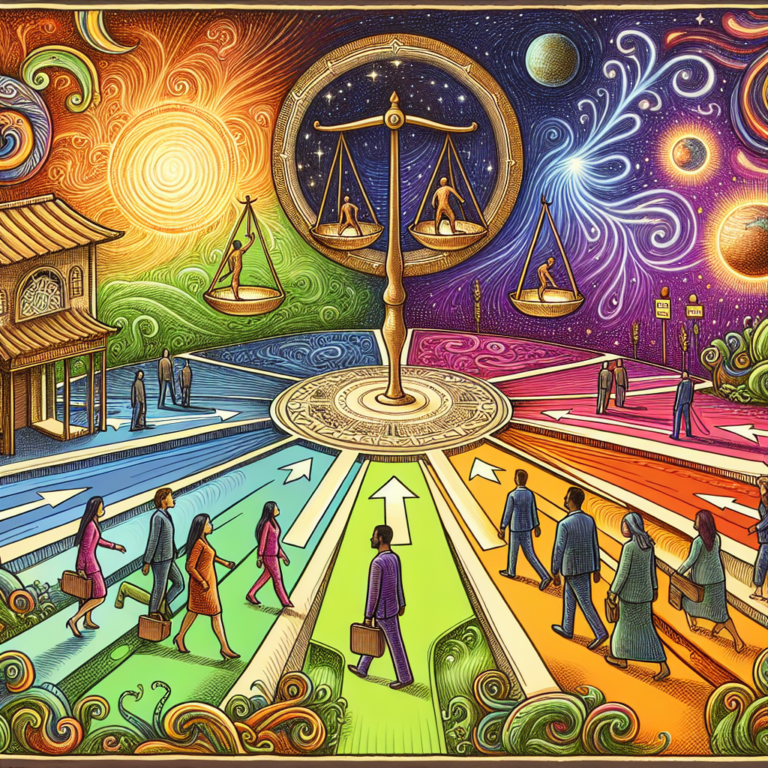In a world where chaos and complexity often reign, the notions of kindness and gratitude emerge as vital threads that weave the fabric of our lives. The cyclical nature of these virtues not only fosters personal growth but also influences the broader tapestry of society. Central to this discussion are two pivotal concepts: karma and gratitude. Each plays a significant role in shaping individual destinies and establishing a communal atmosphere of support and positivity.
Understanding Karma
Karma, a principle deeply rooted in various spiritual traditions, particularly in Eastern religions such as Hinduism and Buddhism, posits that every action has consequences. The concept can be distilled into a straightforward premise: the energy you emit into the world—through thoughts, actions, and intentions—returns to you in some form. This energy can manifest as positive experiences for benevolent deeds or negative outcomes for malevolent behaviors.
The Cycle of Cause and Effect
The cycle of karma functions through a cause-and-effect relationship. Kind actions generate goodwill not only for the recipient but also for the giver. For example, when we help an elderly neighbor with groceries, the immediate effect is their gratitude, but it also fosters a feeling of fulfillment within us. This positive energy often leads us to act kindly again, creating a self-replenishing cycle.
Karma highlights the connectivity of human experiences. What we put out into the universe often comes back in unexpected ways. The interconnectedness of our actions and their repercussions underscores the importance of acting with kindness and mindfulness.
The Transformative Power of Kindness
Kindness can be seen as the catalyst that ignites the cycle of positive karma. The simple act of being kind can lead to a ripple effect. Kindness begets kindness, and in many cases, the consequences extend beyond the immediate interaction.
Psychological Benefits
Research supports the idea that engaging in acts of kindness can enhance not only the well-being of the recipient but also that of the giver. Neurotransmitters such as serotonin and oxytocin are released when individuals give or receive kindness. These hormones can create feelings of happiness and even reduce stress levels, reinforcing the idea that kindness is a two-way street.
Moreover, performing acts of kindness can lead to a sense of purpose and belonging. Whether one participates in community service, helps a colleague, or extends a hand to a stranger, these acts contribute to social cohesion. In a world that can often feel isolating, kindness fosters connections, creating a supportive environment that benefits everyone involved.
Gratitude: The Heart of the Cycle
Gratitude is the acknowledgment of the good in our lives and the appreciation for those who contribute to our happiness. It complements kindness by recognizing the kindness of others, forming another essential loop in the cycle.
The Science of Gratitude
Numerous studies indicate that practicing gratitude can lead to improved mental health and well-being. Individuals who regularly express gratitude report lower levels of depression and anxiety and are more likely to engage in helpful and kind behaviors. Gratitude shifts our focus from what we lack to what we have, cultivating a positive outlook that enhances our relationships with others.
Gratitude as a Motivator
Gratitude often motivates individuals to "pay it forward." When we feel grateful for the kindness we’ve received, it inspires us to extend that kindness to others. This cyclical nature can lead to a profound transformation in social dynamics. A simple "thank you" or a heartfelt acknowledgment can inspire individuals to be kinder not just to the initial giver but to others within their sphere of influence.
The Interplay Between Karma and Gratitude
The relationship between karma and gratitude is synergistic. While karma emphasizes the consequences of our actions, gratitude highlights the acknowledgment of those actions. Together, they form a powerful duo that can greatly enhance the quality of our lives and our communities.
Creating a Cycle of Positivity
When individuals act kindly, they create positive karma. This karma often leads to experiences that ignite feelings of gratitude. In turn, expressing gratitude can motivate further kind actions, thus perpetuating the cycle. This dynamic interplay between karma and gratitude reinforces the idea that our actions not only affect ourselves but resonate throughout the larger community.
An example of this may be witnessing a random act of kindness in your community—perhaps someone pays for a stranger’s coffee. The recipient feels uplifted and inspired and is likely to pay it forward. The initial kindness reverberates, sparking a chain reaction that elevates spirits and fosters community bonds.
Embracing the Cycles of Kindness
To harness the power of these cycles in our daily lives requires intentionality. Below are some approaches to nurture karma and gratitude in everyday interactions:
Practice Mindfulness: Being aware of our thoughts and actions helps us make conscious choices that align with kindness. Mindfulness can facilitate spontaneous acts of kindness and allow us to appreciate small gestures from others.
Maintain a Gratitude Journal: Write down things you are grateful for each day. This practice helps shift focus from negative experiences to positive ones, reinforcing a gratitude mindset.
Engage in Community Activities: Participation in local organizations or volunteer efforts can create opportunities for both kindness and gratitude. These activities foster connection and enhance social support.
Express Thanks: Regularly verbally acknowledge the efforts of those around you, whether at work or home. Simple thank-yous can inspire continued kindness and gratitude.
- Commit to Kindness: Make a conscious effort to extend kindness daily, whether through a compliment, a helping hand, or simply being present for someone in need.
Conclusion
The cycles of kindness, fueled by the principles of karma and gratitude, create a compelling framework for understanding interpersonal relationships and community dynamics. As we cultivate kindness and express gratitude, we strengthen the bonds that unite us, creating a ripple effect that enhances our collective experience. By embracing this cycle, we can transcend personal challenges, create a nurturing environment, and contribute positively to the world around us.
FAQs
Q1: What is karma, and how does it work?
A1: Karma is a principle that suggests that every action has a consequence. The energy we put into the world—through thoughts, actions, and intentions—returns to us, shaping our experiences.
Q2: How can practicing kindness impact my mental health?
A2: Engaging in acts of kindness has been shown to release neurotransmitters like serotonin and oxytocin, promoting feelings of happiness and reducing stress and anxiety levels.
Q3: What role does gratitude play in the cycle of kindness?
A3: Gratitude helps acknowledge the kindness of others and motivates individuals to reciprocate that kindness, further perpetuating the cycle of positive actions.
Q4: How can I practice gratitude effectively?
A4: Keeping a gratitude journal, regularly expressing thanks, and focusing on the positive aspects of life are effective strategies for cultivating gratitude.
Q5: What are some ways to promote kindness in my community?
A5: Volunteer for local organizations, support community events, or simply engage in random acts of kindness in your daily life to promote a culture of kindness.
It seems like you might be looking for a specific prompt or topic to discuss. Could you please provide more details or specify what type of prompt you’re interested in? This could be related to writing, creativity, a specific subject, or something else entirely!, #Cycles #Kindness #Karma #Gratitude #Shape #Lives, #Cycles #Kindness #Karma #Gratitude #Shape #Lives, 1735610376, the-cycles-of-kindness-how-karma-and-gratitude-shape-our-lives





